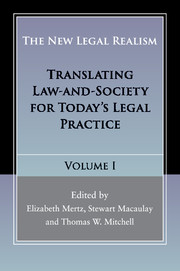Book contents
- Frontmatter
- Contents
- List of contributors
- Preface to The New Legal Realism, Volumes I and II
- 1 Introduction: New Legal Realism: Law and Social Science in the New Millennium
- Section I THE PLACE OF NEW LEGAL REALISM IN LEGAL THOUGHT AND TEACHING
- Section II PHILOSOPHY AND METHODS FOR A NEW LEGAL REALISM
- Section III NEW LEGAL REALIST TRANSLATIONS
- 10 New Legal Realism and Inequality
- 11 The Financial Crisis and Moral Accountability: Translating Practices of Risk, Profit, and Uncertainty
- 12 The Moment of Possibles: Some New Legal Realism about a “Reality Thriller” Case
- 13 Translating Law across Cultures and Societies: A Conversation with David Bellos and Kim Lane Scheppele
- 14 Is There a Lingua Franca for the American Legal Academy?
- Index
- References
13 - Translating Law across Cultures and Societies: A Conversation with David Bellos and Kim Lane Scheppele
from Section III - NEW LEGAL REALIST TRANSLATIONS
Published online by Cambridge University Press: 05 May 2016
- Frontmatter
- Contents
- List of contributors
- Preface to The New Legal Realism, Volumes I and II
- 1 Introduction: New Legal Realism: Law and Social Science in the New Millennium
- Section I THE PLACE OF NEW LEGAL REALISM IN LEGAL THOUGHT AND TEACHING
- Section II PHILOSOPHY AND METHODS FOR A NEW LEGAL REALISM
- Section III NEW LEGAL REALIST TRANSLATIONS
- 10 New Legal Realism and Inequality
- 11 The Financial Crisis and Moral Accountability: Translating Practices of Risk, Profit, and Uncertainty
- 12 The Moment of Possibles: Some New Legal Realism about a “Reality Thriller” Case
- 13 Translating Law across Cultures and Societies: A Conversation with David Bellos and Kim Lane Scheppele
- 14 Is There a Lingua Franca for the American Legal Academy?
- Index
- References
Summary
In this transcribed exchange, translation scholar David Bellos and interdisciplinary legal scholar Kim Lane Scheppele shared with a group of undergraduate students the challenges involved in translating law across languages, cultures, and legal systems. Sometimes trying to create an “exact” translation actually backfires, creating only an illusion of equivalence that does not exist. Scheppele and Bellos discuss how to deal with seemingly untranslatable divisions among differing cultural, social, and legal expectations and understandings – along with the challenges of translating law across different languages.
OPENING QUESTION:
Can everything be translated into the languages of law around the world, or are there some things that are just not translatable?
DAVID BELLOS [DB]:
The answer to this question is obviously: no, and yes. From one point of view legal language is the very model of the untranslatable. On the other hand, legal language gets translated all the time, because it has to be. How do you keep out of jail if someone pulls you off the road when you're in a foreign country? Obviously not by learning the language in double quick time, but through translation. How is international business possible? Only because legal contracts get translated. If you do end up in court when abroad, you're likely to find that you have a right to be represented in a language that you do understand, especially if you are the defendant in a criminal trial. Here, in New York for example, the court system employs a large staff of interpreters and translators who service 140 different languages so as to give all defendants the same right to be heard and to understand irrespective of the language they speak. Translation of the law happens, it happens all over the place, it happens all the time.
Despite all this real-world evidence to the contrary, the law is in essence not transferable from one language to another. Law is always located within an institutional, social, and cultural framework that uses words in a special way. Words of ordinary language acquire specific meanings when they are used as legal terms, and some of the terms of law don't mean anything at all outside their specific legal frame.
- Type
- Chapter
- Information
- The New Legal RealismTranslating Law-and-Society for Today's Legal Practice, pp. 266 - 288Publisher: Cambridge University PressPrint publication year: 2016

